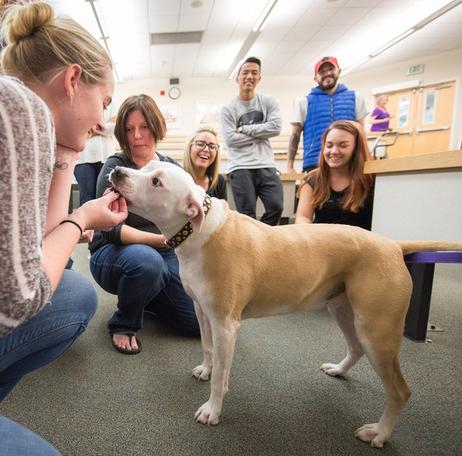If you love working with creatures furry, scaly, and sometimes prickly, then community college can be an excellent starting point for your animal service career. In fact, according to College Grad, students interested in animal service have a wide variety of career options, including animal training, veterinary assistance, zoological services, kennel attending, breeding assistance, grooming services, and much more.
If animals are in your professional future, learn more about unique community college classes that can help prepare you for your career in animal services!
Animal Care Career Pathways
Animal Care and Management Technology
For students interested in learning the necessary skills and experiences to work in the animal care industry, Durham Technical Community College (DTCC), located in Durham, North Carolina, provides diverse courses and opportunities for hands-on practice.
As DTCC explains, courses in the Animal Care and Management Technology program teach students about the basic sciences of animal work, while instructors also educate students on the legal and management skills that are essential for both animal and human interactions. Adding to this, “This course of study offers the student a wide variety of employment options. Opportunities exist with humane organizations, kennels, city and county animal control agencies, animal shelters, zoos, residency facilities, and veterinarians.”
In addition, to help students who are juggling challenging schedules, DTCC also offers cooperating courses at the nearby Alamance Community College Campus. With this option, students can enroll in select weekend courses at Alamance while also continuing their weekly course schedules at the Durham campus.
This video outlines the classes you need to take to become a veterinarian.
Veterinary Technology
For students seeking a career in veterinary care, schools such as the Portland Community College (PCC), located in Portland, Oregon, allow students to earn their Associate of Applied Science Degree to work in the field of veterinary technology.
As PCC explains, students with a degree in applied veterinary sciences can gain employment in fields related to research, zoo care, parks, wildlife preserves, animal control organizations, and even veterinary diagnostic laboratories. Delving deeper into this pathway, PCC further asserts, “Becoming a veterinary technician can provide you with the skills and knowledge you need to work towards the greater good of animals and to prepare you to begin working to understand their unique contribution to all of our lives.” As working with animals helps students broaden their understanding and appreciation of animals in society, the veterinary technology program ensures that all students gain diverse skills and knowledge to improve their lives and their habitats.
This video offers an overview of the veterinarian training program at Central Oregon Community College.
Zoo Animal Technology Program
Santa Fe Community College (SFCC), located in Gainesville, Florida, is the country's premier wild animal technology program with a rare and unique degree pathway. With its very own zoo for hands-on training and instruction, SFCC provides students with 10 acres of diverse animal collections. By working with mammals, birds, reptiles, and amphibians, students learn about the details of daily care for animals, working with the public, and even habitat construction and maintenance.
To graduate from the program, students will complete five semesters of courses that range from practical instruction to clinical experiences. Also, since the zoo welcomes more than 30,000 visitors each year, students will be able to gain even greater experiences as public tour guides and informational aides. As students move through the required courses, individuals will enroll in engaging classes such as:
- Basic Keeper Technology and Lab
- General Biology
- Animal Management Lab
- Animal Nutrition
- Animal Breeding
- Mammal Culture
- Related Zoo Topics
- Aquarium Culture
- General Psychology
In today's world, the animal healthcare field offers a plethora of rewarding career opportunities for individuals with a passion for animals. For those seeking an affordable and comprehensive education, community colleges have emerged as a valuable gateway to entering this esteemed profession. In this essay, we will explore the various courses and training programs offered by community colleges that can lay a solid foundation for a successful career in the animal healthcare field.
Basic Keeper Technology and Lab:
Community colleges provide an excellent starting point for aspiring animal healthcare professionals through courses such as Basic Keeper Technology and Lab. This course introduces students to the fundamental principles of animal care, including feeding, grooming, and general husbandry techniques. Through hands-on lab sessions, students gain practical experience in handling and caring for different species, fostering a deep understanding of animal behavior and welfare.
General Biology:
A strong understanding of biological concepts is essential for anyone pursuing a career in animal healthcare. Community colleges offer General Biology courses that cover topics such as cell biology, genetics, and physiology. These foundational principles provide students with a solid understanding of the biological processes underlying animal life, preparing them for more specialized coursework in the field.
Animal Management Lab:
In an animal healthcare career, effective management skills are vital to ensure the well-being and welfare of animals. Community college programs often include Animal Management Lab courses that focus on developing essential skills in animal handling, restraint, and safe administration of medications. By combining theoretical knowledge with practical experience, these courses equip students with the expertise required to excel in animal healthcare facilities.
Animal Nutrition:
Proper nutrition plays a crucial role in maintaining the health and well-being of animals. Community colleges recognize this importance and offer courses in Animal Nutrition. These courses delve into the principles of animal nutrition, dietary requirements for different species, and the role of nutrition in disease prevention and management. Students can contribute significantly to improving animal health outcomes by gaining expertise in this area.
Animal Breeding:
Community colleges provide specialized courses in Animal Breeding, offering students a comprehensive understanding of the principles and techniques involved in animal reproduction. Aspiring professionals learn about genetics, reproductive physiology, and breeding management through these courses. This knowledge is invaluable for those interested in working with breeding programs or contributing to the improvement of animal populations.
Mammal Culture:
For individuals with a passion for marine mammals, community colleges often offer courses in Mammal Culture. These courses explore the unique requirements and care techniques associated with marine mammals in captivity. From understanding behavioral enrichment to ensuring proper habitat design, students gain insights into providing these captivating creatures with a healthy and enriching environment.
Related Zoo Topics and Aquarium Culture:
Community college programs also cover a range of subjects related to zookeeping and aquarium culture. Courses like Related Zoo Topics provide students with an overview of zoo management, conservation, and public education, while Aquarium Culture courses focus on the care and maintenance of aquatic species in aquarium settings. These courses expose students to the specific needs and challenges associated with these environments, preparing them for careers in zoos, aquariums, or related institutions.
General Psychology:
A solid understanding of human psychology is crucial in the animal healthcare field, particularly when dealing with pet owners or addressing animal behavior issues. Community colleges recognize this and often include General Psychology courses in their curriculum. These courses explore the basics of human behavior, communication, and interpersonal skills, providing students with the necessary tools to interact effectively with both animals and their human caretakers.
Community colleges serve as invaluable platforms for aspiring animal healthcare professionals, offering diverse courses that lay the groundwork for a fulfilling career. Whether through courses in Basic Keeper Technology and Lab, Animal Nutrition, or General Psychology, community college training provides a comprehensive education combining theoretical knowledge and practical skills. By embracing the opportunities available at community colleges, individuals can embark on a rewarding journey toward a successful and compassionate career in the animal healthcare field.
Questions? Contact us on Facebook. @communitycollegereview
#animalhealthcare #veterinariantraining












